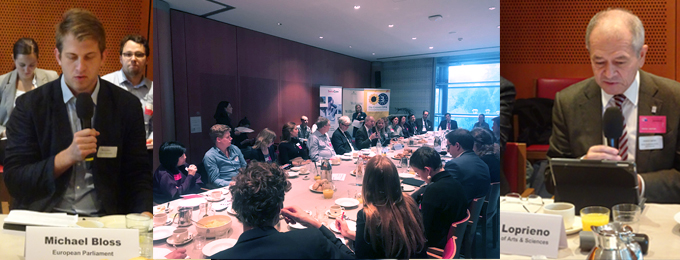A breakfast debate hosted by Michael Bloss MEP gathered scientists, academies and policy makers to discuss how to use scientific evidence for the common good.
Science with and for Society is high on the European agenda currently. The European Commission (EC) is practicing co-design for their next framework programme for research and innovation, Horizon Europe, through public consultations and the R&I Days in Brussels, and has developed new instruments to address societal challenges and create a direct impact on Europe and its people, such as missions. However, how can science learn about citizens’ concerns and partner up with citizens to make a difference? How can policy makers ensure they reach out beyond elite in gathering input? To discuss these issues, SwissCore joined forces with the Representation of the State of Baden-Württemberg to the European Union and invited to a breakfast debate at the real representation of the European people, the European Parliament (EP). An audience of nearly 50 people gathered in the EP’s Members Salon, despite the early morning setting and the Brussels autumn weather.
The breakfast hosted by Member of the European Parliament (MEP) Michael Bloss (Germany, Greens/European Free Alliance) provided plenty of food for thoughts in addition to fresh croissants and coffee. MEP Bloss pointed out already in his welcome speech that “policy makers do read what scientists write and have an appetite for understanding and explanations”. The ball is thus back with the scientists, they have to provide information that people beyond their field of expertise and the scientific community can understand. Here is a role for academies and learned societies. Antonio Loprieno, President of the Swiss Academies of Arts and Sciences and of the European Federation of Academies of Sciences and Humanities (ALLEA), sees the function of academies in intensifying the dialogue of scientists with citizens and translating research into intellectual decisions. This is not always easy in a digital world, where science is openly available and changeable and where it becomes difficult to distinguish between true or false.
Ana Arana Antelo, Adviser for Citizens at the EC’s Directorate General for Research and Innovation wants to reinvent the link to citizens from a top-down to a two-way communication. The EC listens to citizens in their political choices and works with stories and videos to gain the public’s interest. On top, she suggests promoting education in science for all and training politicians and scientists to communicate with citizens. It seems that with their latest efforts to reach out, the EC has at least in part succeeded; most answers to the public consultation on the Horizon Europe Strategic Plan come from individuals rather than institutions.
However, before policy of whatever kind can intervene in the world, it has to recognise a problem first. Ortwin Renn, professor at the University of Stuttgart and Scientific Director at the Institute for Advanced Sustainability Studies (IASS) in Potsdam, explained the policy making process and the role of science therein. First, science must help policy makers understand a problem, second it can help generate better policy options, assess the consequences of such options and identify trade-offs. Last, science can support the balancing of decisions, since uncertainty in science is still better than intuition. This applies especially to problems like climate change, where negative consequences of decisions may not become visible for a long time and other wrong decisions may be taken up to a tipping point.
To round off, MEP Bloss made another appeal to science, “develop the technology for after 2050 now”, he said, as we need to prepare for the decarbonized society we will be living in then. Nevertheless, of course, using science for policy is also a matter of trust, even if you do not have to be a chemist to understand the consequences of some chemical interventions, we also have to rely on the facts presented by science and accept that they cannot be negotiated.

